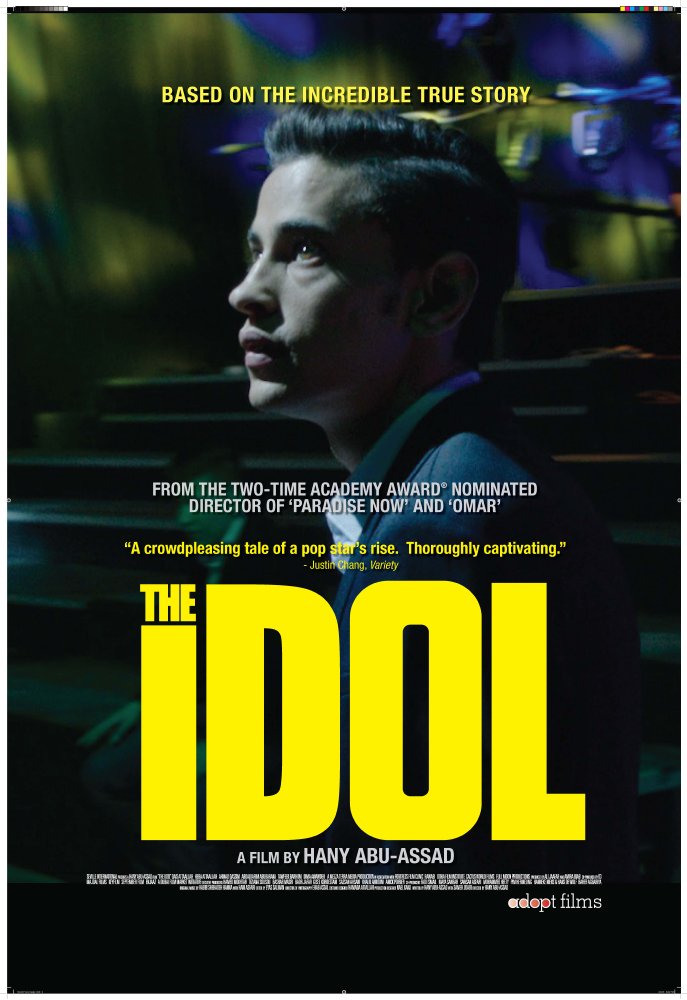Joyce Glasser reviews The Idol (August 12, 2016)
The Idol is another story about a young person beating the odds to win a life-altering competition. We’ve seen films about competitions in sports, mathematics, chess, dancing, and even quiz shows (Slumdog Millionaire). There have even been several films about singing competitions in orthodox cultures, such as the heavily criticised Rock the Kasbah and the moving documentary Afghan Star, about the difficulty of bringing Pop Idol to Afghanistan.
 Though it is no masterpiece, Hany Abu-Assad’s The Idol, stands out from the crowd. Not only is The Idol based on the life of Palestinian wedding singer-turned-singing champion-turned-UN Ambassador Mohammed Assaf, but it is directed by Palestinian-born, Hany Abu-Assad who has a success story of his own. Abu-Assad’s 2006 feature Paradise Now and his 2013 feature Omar were both nominated for Academy Awards in the foreign language category.
Though it is no masterpiece, Hany Abu-Assad’s The Idol, stands out from the crowd. Not only is The Idol based on the life of Palestinian wedding singer-turned-singing champion-turned-UN Ambassador Mohammed Assaf, but it is directed by Palestinian-born, Hany Abu-Assad who has a success story of his own. Abu-Assad’s 2006 feature Paradise Now and his 2013 feature Omar were both nominated for Academy Awards in the foreign language category.
Mohammed Assaf (Qais Atallah) lives with his loving, middle-class parents in a refugee ghetto in Gaza. In 2005 he forms a band with his tomboy sister Nour (Hiba Atallah) and their two friends in order to earn money performing at weddings. The film chronicles the challenges the children face saving up enough money to buy musical instruments, including a nasty run in with a smuggler who steals their hard- earned cash. Mohammed, we note, does not shirk from doing what it takes to get the job done, even at risk to his personal safety.
Then tragedy strikes when Nour collapses at a performance and is diagnosed with kidney failure. Nour and her family face a hard choice: a life of dialysis; finding a donor (Mohammed’s kidney is incompatible and the film does not bother with exploring other possible donors); or buying a kidney for $15,000, which the family cannot afford. During dialysis treatment, Nour and Mohammed meet the pretty Amal (Teya Hussein), another patient at the clinic. Though Amal and Mohammed are very young, they are instantly attracted to one another.
Mohammed seems determined to earn enough money to buy Nour (if not Amal) a kidney. Though he fails in relation to Nour, he bumps into Amal (Dima Awawdeh) seven years later when he is a handsome young man (played by Tawfeek Barhom). Amal is at university and Mohammed is driving a taxi to pay his university fees. At Amal’s insistence, Mohammed sings for her and a friend. ‘We may be surrounded by ugliness,’ she tells him emotionally, ‘but your voice is still beautiful.’
When Mohammed learns about auditions for Arab Idol in Cairo, the odds are against him. For starters, he needs to call in an old debt from the smuggler to get a forged visa. The real Mohammed Assaf really did overcome all of the obstacles in his way, pretty much as described in what is the best, and most exciting, part of the film. Even the singing in the toilet episode really did happen as shown. What is also true is that while Mohammed faces initial opposition from Hamas (represented in the film by his boyhood friend-turned-soldier Omar (Ahmad Al-Rokh), his talent soon makes him a symbol of national pride in an area where that is in short supply.
The Idol is an entertaining and uplifting film, even if it is a challenge to appreciate the music out of context. The unusual setting, the charming performances and the fact that it is based on a true story help us forget the film’s inevitably formulaic nature.
Hany Abu-Assad ends the film with the competition and does not show him returning to Gaza or to Amal. Post-action and pre-end-credit captions fill us in on Assaf’s life after the competition, but there is no mention of Amal, kidneys, or, for that matter, of prize money. We expect him to buy Amal a kidney or start a campaign to raise awareness of the need for organ donors, but those expectations, while they might be clichéd, are inevitable in the context of this story. If you search online there is no mention of a death in the family from kidney failure, let alone a girlfriend on dialysis who inspired Assaf to stick with it when the pressured young man is on the verge of quitting the competition. Given the specific and morbid nature of this subplot, it’s an odd one to invent and even odder to drop at the end.
In short, the scenes that seem to have been invented to inject suspense into the story turn out to be true, while the entire subplot of kidney failure – and it takes up a chunk of the film – might not be. This is the major sticking point of an otherwise enjoyable film.
You can watch the film trailer for here:




